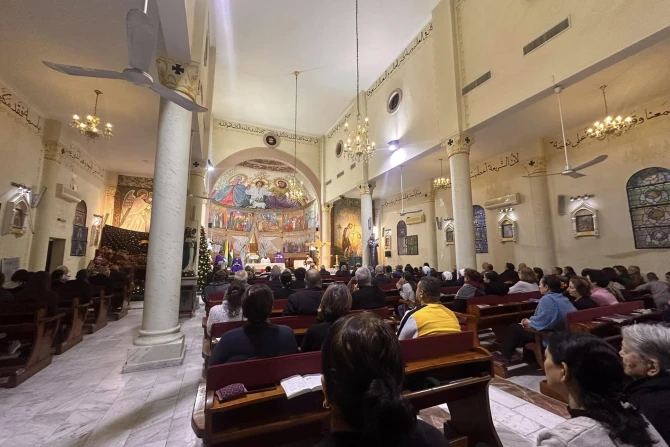FOX: Biden’s Education Secretary Vows to Shut Down the Largest Christian University in the US, by Joshua Q. Nelson
April 20, 2024Mike Johnson’s Spending Bill Includes $300M for Border Patrol — in Ukraine, by John Binder
April 20, 2024
By Msgr. Charles Pope, April 19, 2024
The Gospel from last Saturday’s daily Mass (Saturday of the 2nd Week of Easter) describes troubles rising and demonstrates how to endure them:
When it was evening, the disciples of Jesus went down to the sea, embarked in a boat, and went across the sea to Capernaum. It had already grown dark, and Jesus had not yet come to them. The sea was stirred up because a strong wind was blowing. When they had rowed about three or four miles, they saw Jesus walking on the sea and coming near the boat, and they were afraid. But he said to them, “It is I. Do not be afraid.” They wanted to take him into the boat, but the boat immediately arrived at the shore to which they were heading (John 6:16-21).
The images in this passage are reminiscent of the journey of life. The disciples have set out in a boat to cross to the other shore. We, too, have set out for another shore in our life. Darkness grows for them as it often does for us. The winds are contrary, and the sea becomes choppy. The must row because the sails are useless. So it is for us also. We would rather let the wind carry us effortlessly to the other shore, but while life has many pleasant moments when we can do this, there are other times when the storms and winds assail us and make our journey difficult.
The disciples are a few miles into their journey when the crisis arises—or is it a blessing? They see Jesus walking on the water. Although He is their blessing, they don’t see it that way. Other gospel passages say that they thought they were seeing a ghost (e.g., Matt 14:26).
Life can be like this. Our blessing, our solution, our healing can be right in front of us, yet we are terrified. I remember one time when my cat was trapped in the attic of the rectory (I have no idea how she got up there). We made an opening in the ceiling to get her out, but she was too terrified to come near enough that I could let her down. It took a long time (and some kitty snacks) to lure her. Although I was her rescuer, she saw me as her tormenter. We are often like this, fearing the very Savior sent to us. We are like children who scream in fright as the doctor approaches with the shot that will cure or prevent sickness. The Lord God once said of us,
When Israel was a child, I loved him, and out of Egypt I called My son. But the more I called them, the farther they ran from Me …. Yet it was I who taught Ephraim to walk, taking them in My arms, but they never realized that it was I who healed them … [who] bent down to feed them (Hosea 11:1-4).
Yes, we often fear the very source or means of our blessing.
The text says, “… and they were afraid.” They are looking right at Jesus, their savior, yet they do not realize it; they do not recognize Him and are afraid. We, too, are like this. Why do we sometimes fear Jesus, the very source of our salvation? Because He does not always heal us on our terms. He talks of strange remedies like the cross. Strangely, He permits storms in our life and we are both fearful and resentful. However, the very cross and storms we fear are often the means by which He saves us! We need some degree of suffering and storms to keep us humble, to help us to grow in wisdom, to trust Him, and to keep calling on Him. Jesus talks of unsettling things like taking up our cross and following Him, losing our life so as to find it and save it. Jesus Himself won the victory hanging on a cross, not astride a war-horse slaughtering His enemies.
We see Jesus coming toward us in a storm, but rather than simply stopping the storm, He tells us not to be afraid. Why doesn’t He just take away the storm? I don’t know; He simply says, Do not be afraid. It is I. In the Gospel of John, Jesus says, In this world you will have tribulation, but take courage; I have overcome the world (Jn 16:33).
Jesus wants His presence to be enough for us. He is with us, so why are we afraid? There are going to be storms; that’s a promise—but He will be with us; that, too, is a promise. There’s a saying that’s particularly: “Don’t tell God how big your storm is. Tell the storm how big your God is.”
The gospel passage we are discussing ends abruptly by saying, They wanted to take him into the boat, but the boat immediately arrived at the shore to which they were heading. Well, what do you know, they finally understand that it is Jesus and they reach the shore!
Note that there is no indication in the passage that the storm ended. The winds may have still been blowing, the seas still rough, but none of that matters once they have reached their destination. One may think that this destination merely refers to the boat docks at Capernaum, but that would be worldly, limited, and erroneous. The shore to which we all sail is none other than the Lord Himself. He is our peace, our goal, our destination.
At times His solutions may involve paradox. The cross is strange medicine to the worldly—but loss can usher in gain, a door may close only that another may open, death can bring life. Do not be afraid; He is near. That is not a ghost approaching you in the storm, it is the Lord! All things work together for good to them that love God, to them who are the called according to his purpose (Rom 8:28).
This is a vignette, an essay on life. Storms will come, but the solution is near: Do not be afraid. It is I.
Help me, Lord, to know that you are the source of my peace. You are always near; Help me to hear your voice, saying, Do not be afraid. It is I.
There is an old gospel song that has these lyrics:
I love the Lord;
He heard my cry;
And he pitied every groan.
Long as I live;
And troubles rise;
I’ll hasten to his throne.
The storm described here is a storm that came to them. There are other storms in our life that can be avoided. Monday’s post will deal with that.







